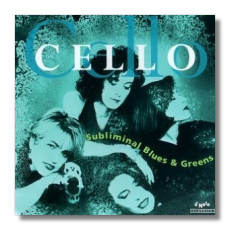
The Internet's Premier Classical Music Source
Related Links
- Latest Reviews
- More Reviews
-
By Composer
-
Collections
DVD & Blu-ray
Books
Concert Reviews
Articles/Interviews
Software
Audio
Search Amazon
Recommended Links
Site News
 CD Review
CD Review
Subliminal Blues & Greens

- Charlie BISharat: Lying in Wait
- Mark Weber: Walking Man
- Jeff Beal: Six Mile Creek
- Pilley: Snow Pony
- Mark Weber: Jommin' Mon
- Kim Scharnberg: Subliminal Blues and Greens
- George Thatcher: Suite For Transient Minds
- Jeff Beal: Bela in Blue
- Steven Baun: Street Mapping
- Kenn Chipkin: Funk by Proxy
- Jon Werking: Folk Prayer
- Tom Rizzo: Cadillactica
- Kim Scharnberg: Goodnight (For Home)
CELLO
d'Note Classics DND1011
I took one look at the list of works on the jewel case and the thought popped into my head: "Oh God, more New Age crap!" As it turns out, I was mostly very pleasantly surprised. There are only a couple of New Eggy tracks. Most of the stuff is actually composed by people who know how to do more than noodle around on a synthesizer. My big problem with New Age is that it's not very interesting and that the minds that produce it bore me as well. I once heard some N. A. semi-musician (I recognized him as part of the N. A. because he kept talking about "the planet" where most people would have used the word "earth") blather about how N. A. M. (New Age Music, which, significantly, also stands for National Association of Manufacturers) was the New Romanticism. Barber, I'm sure, would be pleased. What the guy meant was that the music concentrated on evoking warm, fuzzy feelings and was played by "Romantic" instruments like oboes, horns, and cellos. Enough rant. How's the album?
Like almost any anthology, this one mixes diamonds and dreck. A cello quartet is a rarity. Before this disc came my way, I knew of only two works for the combination: one by the marvelous Grażyna Bacewicz and the other by Heitor Villa-Lôbos, both of them string players. I suspect that CELLO commissioned most, if not all, of the works on this program. They got a set of encore pieces, analogous to Perlman's Kreisler album – nothing wrong with that, but the repertoire doesn't really test the musicians' mettle. I wish the group had replaced some of the weaker works with a piece that challenged them more. As it stands, I have very little idea of their musical personalities, despite delightful playing.
The CD interests me mainly because the composers here work beyond the usual concert-music playground. Most of them make their living as pop and rock musicians, some even jobbing for the likes of the Tesh and the Yanni. The pieces here lie outside the normal course of their composers' careers. They seem written "for the desk drawer," so to speak. The disc's high points include the works by Kim Scharnberg in particular, Mark Weber, and Charlie BISharat. Works that, if I never heard them again, I would not die unfulfilled include those by Beal, Pilley, and Thatcher – all of which betray their origins in the piano and guitar stylings of N. A. drivel. In most of the tracks, I find encouraging signs, the most hopeful of which being the appropriation of folk and vernacular music for the purposes of high art. Composers, of course, have been doing this for hundreds of years, but since the late 19th century, they seem to rely less and less on such sources. For example, as much as I love his music (and indeed I do), Webern deliberately cuts himself off from these traditions, which after all nourished such none-too-shabbies as Bach, Haydn, Brahms, and Mahler. It seems to me one ignores the vitality of the vernacular at one's artistic peril, and it may well be one reason for the public at large seeking its musical entertainment somewhere other than the concert hall. The composers here find their materia in the vernacular. Music as entertainment – "seeking humbly to please," in Debussy's phrase – is neither a foreign nor a suspect concept to them. For instance, in the title cut, "Subliminal Blues and Greens," Kim Scharnberg opens with the quartet making the sounds of congeries of singing whales or the nocturnal street noise in a big-city bad neighborhood that filters through the window as one nods off to sleep. From here, he moves magically into a standard, if not cliché, r & b riff which dominates the rest of the piece in a flurry of inventive counterpoint – the cello quartet as funk band. Reggae, blues, and punk as well drift through the other selections.
The sound evokes a small, slightly reverberant hall, rather than an intimate room, but it's not overmiked. The separation of voices is excellent and the recorded balance quite fine, necessary for an essentially monochromatic consort.
Copyright © 1996, Steve Schwartz




















